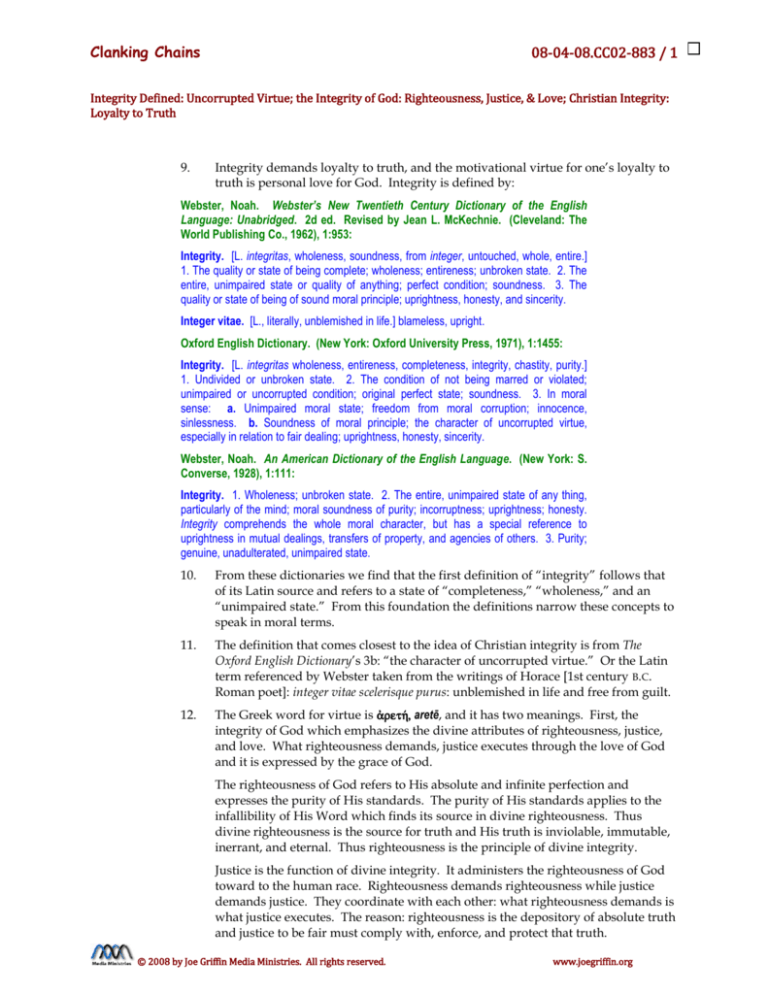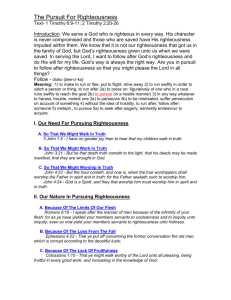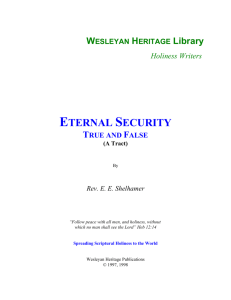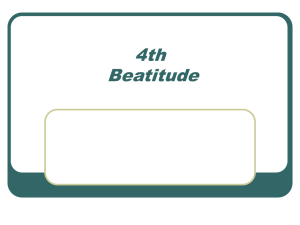
Clanking Chains
08-04-08.CC02-883 / 1
Integrity Defined: Uncorrupted Virtue; the Integrity of God: Righteousness, Justice, & Love; Christian Integrity:
Loyalty to Truth
9.
Integrity demands loyalty to truth, and the motivational virtue for one’s loyalty to
truth is personal love for God. Integrity is defined by:
Webster, Noah. Webster’s New Twentieth Century Dictionary of the English
Language: Unabridged. 2d ed. Revised by Jean L. McKechnie. (Cleveland: The
World Publishing Co., 1962), 1:953:
Integrity. [L. integritas, wholeness, soundness, from integer, untouched, whole, entire.]
1. The quality or state of being complete; wholeness; entireness; unbroken state. 2. The
entire, unimpaired state or quality of anything; perfect condition; soundness. 3. The
quality or state of being of sound moral principle; uprightness, honesty, and sincerity.
Integer vitae. [L., literally, unblemished in life.] blameless, upright.
Oxford English Dictionary. (New York: Oxford University Press, 1971), 1:1455:
Integrity. [L. integritas wholeness, entireness, completeness, integrity, chastity, purity.]
1. Undivided or unbroken state. 2. The condition of not being marred or violated;
unimpaired or uncorrupted condition; original perfect state; soundness. 3. In moral
sense: a. Unimpaired moral state; freedom from moral corruption; innocence,
sinlessness. b. Soundness of moral principle; the character of uncorrupted virtue,
especially in relation to fair dealing; uprightness, honesty, sincerity.
Webster, Noah. An American Dictionary of the English Language. (New York: S.
Converse, 1928), 1:111:
Integrity. 1. Wholeness; unbroken state. 2. The entire, unimpaired state of any thing,
particularly of the mind; moral soundness of purity; incorruptness; uprightness; honesty.
Integrity comprehends the whole moral character, but has a special reference to
uprightness in mutual dealings, transfers of property, and agencies of others. 3. Purity;
genuine, unadulterated, unimpaired state.
10.
From these dictionaries we find that the first definition of “integrity” follows that
of its Latin source and refers to a state of “completeness,” “wholeness,” and an
“unimpaired state.” From this foundation the definitions narrow these concepts to
speak in moral terms.
11.
The definition that comes closest to the idea of Christian integrity is from The
Oxford English Dictionary’s 3b: “the character of uncorrupted virtue.” Or the Latin
term referenced by Webster taken from the writings of Horace [1st century B.C.
Roman poet]: integer vitae scelerisque purus: unblemished in life and free from guilt.
12.
The Greek word for virtue is ¢ret», aretē, and it has two meanings. First, the
integrity of God which emphasizes the divine attributes of righteousness, justice,
and love. What righteousness demands, justice executes through the love of God
and it is expressed by the grace of God.
The righteousness of God refers to His absolute and infinite perfection and
expresses the purity of His standards. The purity of His standards applies to the
infallibility of His Word which finds its source in divine righteousness. Thus
divine righteousness is the source for truth and His truth is inviolable, immutable,
inerrant, and eternal. Thus righteousness is the principle of divine integrity.
Justice is the function of divine integrity. It administers the righteousness of God
toward to the human race. Righteousness demands righteousness while justice
demands justice. They coordinate with each other: what righteousness demands is
what justice executes. The reason: righteousness is the depository of absolute truth
and justice to be fair must comply with, enforce, and protect that truth.
© 2008 by Joe Griffin Media Ministries. All rights reserved.
www.joegriffin.org
Clanking Chains
08-04-08.CC02-883 / 2
Therefore, what righteousness condemns, justice judges; what righteousness
approves, justice blesses. For example, righteousness condemns sin, thus justice
judges sin; it did so at the cross. Righteousness approves of the Lord’s
substitutionary atonement on the cross, thus justice executes salvation to those
who believe.
Each of the attributes that composes divine integrity has direction. For example,
righteousness is integrity’s point of responsibility toward all the sins of mankind.
Justice is integrity’s point of contact toward: (1) the unbeliever at salvation, (2) the
spiritual believer regarding divine blessing, and (3) the carnal believer regarding
divine discipline. Love is integrity’s point of reference toward the unique spiritual
life of the Church Age. God directs His personal love to the believer’s imputed
righteousness whether or not that believer is in status quo spirituality or status quo
carnality.
13.
The second meaning of aretē applies to the believer who is growing in grace. It is
the duty of every believer to acquire in his soul standards and doctrines revealed
from the source of divine integrity and contained in the Bible. As the believer
acquires these standards he develops personal integrity as an internal resource for
right thought, right decision, and right action. The expression of personal integrity
is the execution of these standards toward life and circumstances. This is observed
by others as honor but we can also classify it as the demonstration of the believer’s
virtue or integrity. Thus Christian virtue is the believer’s loyalty to truth when
confronted by the exigencies of life and circumstances.
14.
From these principles we conclude that true virtue finds it source in divine
integrity. Since it originates with God then it cannot be acquired by human beings
except through divine power.
15.
True virtue is defined by the Word of God. Every community of people develops a
system of human virtue that becomes the culture of its civilization. But to
paraphrase Pontius Pilate, “What is virtue?”
16.
If a civilization’s culture is not based on biblical absolutes then it is corrupt and
will eventually fall, unable to maintain order from the source of human viewpoint.
17.
True virtue is found in the souls of advanced believers, the anchor of a client
nation. When a nation’s core of spiritual aristocrats, called the Pivot, continues to
enlarge, then all its citizens prosper by association.
© 2008 by Joe Griffin Media Ministries. All rights reserved.
www.joegriffin.org





